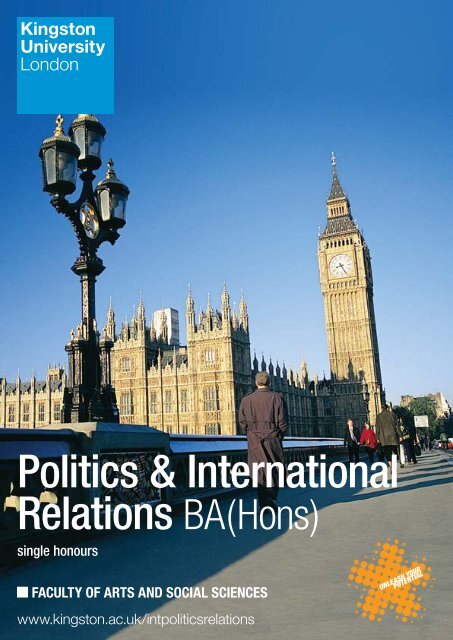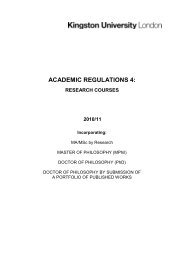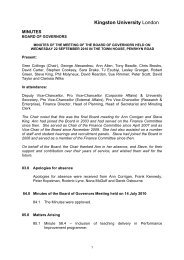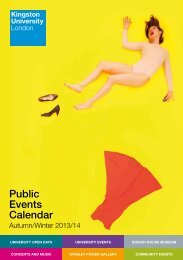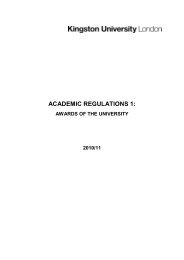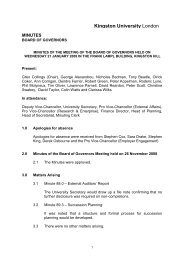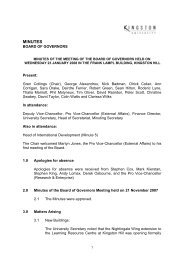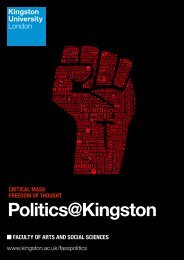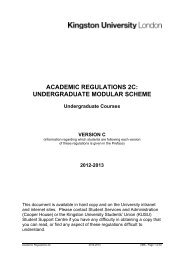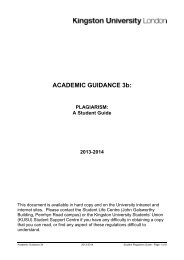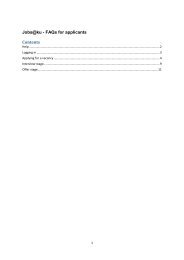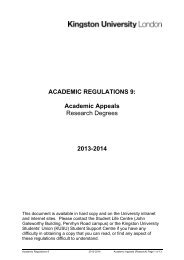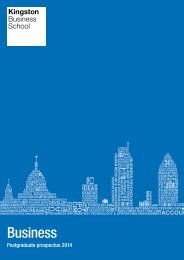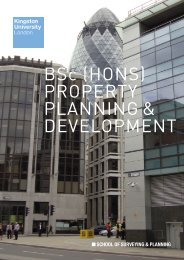Download a PDF course booklet - Kingston University London
Download a PDF course booklet - Kingston University London
Download a PDF course booklet - Kingston University London
Create successful ePaper yourself
Turn your PDF publications into a flip-book with our unique Google optimized e-Paper software.
Politics & International<br />
Relations BA(Hons)<br />
single honours<br />
Faculty of Arts and Social Sciences<br />
www.kingston.ac.uk/intpoliticsrelations
Politics & International Relations BA(Hons)<br />
single honours<br />
This <strong>course</strong> will develop your critical<br />
understanding of global political issues. Whether<br />
the focus is at individual, local, national, regional<br />
or global level, similar questions arise concerning<br />
who gets what, when, how, why and where.<br />
Related questions of power, justice, human rights,<br />
order, conflict, legitimacy and accountability are<br />
considered at a theoretical level and in discussions<br />
of real-life events.<br />
Why study politics and<br />
international relations at<br />
<strong>Kingston</strong> <strong>University</strong>?<br />
• Our academic staff are all active researchers<br />
and experts in their field, and regularly<br />
participate in major international conferences<br />
and publish their research in a variety of<br />
arenas. Our focus on research-informed<br />
teaching ensures that new insights gained<br />
from our recent research are integrated<br />
into our teaching, providing you with a truly<br />
cutting-edge learning experience.<br />
• You will receive high levels of support and<br />
guidance, and will enjoy direct contact from<br />
our internationally diverse and relatively<br />
young team, all of whom are passionate<br />
about teaching and improving the student<br />
experience, with a particular focus on<br />
innovative approaches to teaching.<br />
• Lectures and seminars are regularly<br />
supplemented with visiting guest<br />
speakers – MPs, MEPs, local government<br />
representatives, thinktank policy specialists,<br />
campaigners and activists. Visiting<br />
speakers provide an excellent opportunity<br />
to learn about the ‘real world’ of politics<br />
and make contacts for future careers.<br />
• <strong>Kingston</strong>’s location on the outskirts of<br />
<strong>London</strong> and its excellent transport links into<br />
the City mean that you can study in the<br />
safe, pleasant and less hectic surroundings<br />
of <strong>Kingston</strong> and Surbiton but can travel into<br />
central <strong>London</strong> – the centre of political life in<br />
the UK – in just 25 minutes by train. There<br />
is a wide variety of lectures, workshops,<br />
talks and political events held in <strong>London</strong><br />
throughout the year, and students are<br />
encouraged to participate in these and<br />
learn beyond the classroom.<br />
• Politics & International Relations students<br />
are supported throughout their studies<br />
with an integrated programme of study<br />
skills development, employability training<br />
and one-to-one academic support from a<br />
personal tutor.<br />
Teaching, assessment and support<br />
This <strong>course</strong> is taught through a mixture of lectures,<br />
seminars and workshops, and there is a strong<br />
emphasis on debate and discussion throughout.<br />
You will be assessed in a number of different<br />
ways, including portfolios of reflections on your<br />
work, presentations, essays and examinations.<br />
By the end of the degree you will have a welldeveloped<br />
knowledge and understanding of the<br />
subject and be fully equipped with a range of<br />
analytical skills.<br />
Politics and international relations are discursive<br />
subjects and we want you to gain confidence<br />
and understanding in developing and articulating<br />
your own opinions and views. To do this well,<br />
we recommend that you regularly read around<br />
the subject to help provide a solid foundation for<br />
your ideas. As politics and international relations<br />
are often fast moving, with events unfolding on<br />
a day-to-day basis, there is an expectation that<br />
students bring an awareness of current events to<br />
the classroom.<br />
An important feature of your third year at <strong>Kingston</strong><br />
is the Advanced Research Project, which draws<br />
together the skills and expertise you will have<br />
developed over your three years with us. This<br />
research project can take the form of a traditional<br />
dissertation, a collaborative piece of policyorientated<br />
research or a study report based on<br />
a work placement. Students are supported by a<br />
supervisor, receive training in research skills and<br />
participate in discussion forums to explore their<br />
developing ideas with colleagues on the <strong>course</strong>.<br />
Personal Tutor Scheme<br />
All students are allocated a personal tutor in<br />
induction week, with whom they meet on a<br />
weekly basis in the first year. The personal tutor<br />
will subsequently stay with you throughout your<br />
three years of study. Tutors are approachable and<br />
readily available for discussion and consultation<br />
during the academic year. They are there<br />
throughout to provide advice, guidance and<br />
support at all stages of your academic career and<br />
on your future path after university.<br />
Careers and employability<br />
The Politics & International Relations <strong>course</strong> at<br />
<strong>Kingston</strong> will enable you to develop your writing,<br />
oral and presentation skills, all of which are in<br />
demand in the modern job market. There is<br />
no one specific career to which our graduates<br />
progress and, by the time you have successfully<br />
completed your degree here, you will be equipped<br />
to seek careers in a diverse array of professions.<br />
Past students have followed careers in law,<br />
politics, the civil service, teaching, finance,<br />
journalism and television research.<br />
Employability is embedded in our curriculum and<br />
key skills will be developed throughout your time<br />
with us. Presentation skills, team working and<br />
project management skills are developed in taught<br />
modules, and you will be encouraged at an early<br />
stage to reflect on your existing experience and<br />
future development needs.<br />
„<br />
Want to know more?<br />
www.kingston.ac.uk/<br />
intpoliticsrelations
What will you study?<br />
This degree takes an interdisciplinary approach, examining politics and international relations<br />
from a wide variety of perspectives. Area studies, cultural politics, international politics, human<br />
rights, political theory, history, economics and political sociology all form important components<br />
of your study. You do not need to have studied politics and international relations before, and<br />
the <strong>course</strong> is not just for those who want a career in politics-related fields.<br />
Our programme<br />
Studying politics at <strong>Kingston</strong> offers a radical and<br />
critical questioning of the assumptions upon<br />
which political beliefs are based, whether they are<br />
about the ideal society, the best way to live, or the<br />
correct way in which to think about political reality.<br />
Politics is about who gets what, when, how, why and<br />
where, and raises related questions of power, justice,<br />
human rights, order, conflict, legitimacy, accountability,<br />
obligation, sovereignty, decision-making and<br />
governance. International relations emphasises very<br />
similar concerns, but is centred on regional and global<br />
arenas. It examines global political organisations,<br />
the conflicting and co-operative interaction between<br />
states, intergovernmental organisations and nonstate<br />
actors (such as transnational civil society<br />
groups or transnational corporations).<br />
Studying politics and international relations<br />
together helps to explain the interaction of people,<br />
ideas and institutions from the local to the global,<br />
providing the skills, knowledge and insights<br />
to succeed in a globalised world. This degree<br />
provides the flexibility to study a combination of<br />
political science, international relations and human<br />
rights modules, broadening your understanding<br />
of power, government, conflict and justice from a<br />
variety of different disciplinary perspectives.<br />
Below are examples of just some of the complex<br />
and controversial questions you will encounter<br />
while studying Politics & International Relations.<br />
• Why did 9/11 happen?<br />
• What were the causes of the current global<br />
economic crisis?<br />
• What do we mean by power? Who has it?<br />
• Do elections really change anything?<br />
• Is social inequality natural, or should the state do<br />
something to change it?<br />
• How important is nationalism and what is its<br />
future in a globalised world?<br />
• Is the EU going to replace the nation state?<br />
• Has the United Nations been a success and<br />
what is its future?<br />
• What is happening today in Africa, Latin America<br />
and the Middle East?<br />
• Why is large scale human rights abuse such a<br />
common feature of contemporary armed conflict?<br />
• What is the future of democracy in Europe and<br />
beyond?<br />
Our aim is to help you build the skills and<br />
knowledge to develop your own answers and<br />
responses to these big questions.<br />
Year 1 provides you with the foundation for your<br />
university studies. Taught modules explore the<br />
foundations of political ideas, key concepts and<br />
issues in international relations, the political history<br />
and institutions of the UK, and the key figures<br />
and themes in the development of human rights.<br />
There is also a strong focus on the development<br />
of essential academic skills and approaches to<br />
learning that are necessary for success at university.<br />
Year 2 allows increasing flexibility in your choice<br />
of study topics, and includes a focus on area<br />
studies and the politics of Europe, the Middle<br />
East, Africa, the Balkans and Latin America,<br />
alongside a continued focus on the development<br />
of global human rights mechanisms. You will also<br />
begin to examine theory in more depth, exploring<br />
the conceptions of justice and the thinking tools<br />
that help us to understand contemporary global<br />
politics. During the second year, many students<br />
take the opportunity to study abroad in mainland<br />
Europe, North America, Australia or New Zealand.<br />
Year 3 centres on your final-year research project,<br />
which explores a topic of interest in depth. This<br />
may take the form of a traditional dissertation, a<br />
collaborative policy report or a study based on a<br />
work placement. The project culminates with the<br />
presentation of your project at our end-of-year<br />
student conference. You will also choose from a<br />
range of relevant specialist modules, including a<br />
focus on US foreign policy, area studies, the role<br />
of political violence in the international system,<br />
and the ways in which popular culture has<br />
influenced political movements and prompted<br />
change in society.<br />
<strong>Kingston</strong> Language Scheme (KLS)<br />
KLS enables you to learn a foreign language<br />
alongside your programme of study, completely<br />
free of charge. You can choose to study modules<br />
in Arabic, French, German, Italian, Japanese,<br />
Mandarin (Chinese) and Spanish, with or without<br />
prior knowledge of the language.<br />
Studying abroad<br />
Subject to availability and academic performance,<br />
you will have the opportunity to spend Year 2 of<br />
your studies abroad while still completing your<br />
degree in three years. Many current students<br />
have studied abroad in Continental Europe,<br />
the United States, Australia and New Zealand.<br />
Studying abroad helps you to become a more<br />
effective, independent learner, and provides the<br />
opportunity for new experiences and insights in<br />
different parts of the world. Our ultimate aim is to<br />
equip you with the knowledge and skills that will<br />
help you participate more effectively as a politically<br />
conscious citizen and make better sense of<br />
developments in our fast-globalising world.<br />
Examples of modules<br />
Examples of the modules currently offered are<br />
shown below. The module list varies from year to<br />
year as the <strong>course</strong> structure is reviewed and refined.<br />
Year 1 modules<br />
Another World is Possible provides an<br />
introduction to some of the major strands in<br />
radical political thought, in both their historical<br />
and contemporary contexts. It looks at some<br />
of the ideas and ideologies that have emerged<br />
throughout recent history and have sought to<br />
bring about widespread political, social and<br />
economic reform, examining the ideas themselves,<br />
and the ways in which they were seeking a<br />
fundamental change in the existing system. This<br />
module is also aimed at preparing new students<br />
for their time at university, and will provide advice<br />
and training regarding academic skills and<br />
personal development.<br />
Introduction to International Relations provides<br />
an introduction to foundational concepts in the<br />
study of international relations and significant<br />
issues in contemporary international politics<br />
through which these concepts can be understood<br />
and interpreted. It is designed to help you<br />
reconcile the more abstract concepts that frame<br />
the academic study of international relations with<br />
the empirical issues you may be more familiar<br />
with from news media and your day-to-day<br />
engagement with international politics. It is also<br />
designed to provide a foundation for the study<br />
of international relations theory and to help you<br />
develop skills in academic writing, researching and<br />
writing a report for a non-specialist audience.<br />
Introduction to Human Rights outlines the central<br />
themes in the history and evolution of human rights<br />
and introduces theoretical debates within the field.<br />
Through case studies of particular forms of human<br />
rights violations, the module evaluates the political<br />
and legal structures in place to address these<br />
violations. Over the spectrum of international,<br />
regional and local institutions and mechanisms,<br />
this module also explores a range of organisations<br />
working within the field of human rights, and<br />
looks at how they operate and their success. As<br />
an introduction to the subject, this module looks<br />
at the relationship between theory and practice<br />
within the field of human rights, and uncovers the<br />
challenges faced in defending, protecting and<br />
promoting human rights in the 21st century.<br />
The United Kingdom’s Political History and<br />
Institutions provides a comprehensive overview<br />
of the historical background of the UK’s current<br />
political system and its current operation.<br />
The module examines British political history,<br />
institutions, elections, parties and the media. A<br />
key element of the module is to place the UK in<br />
a comparative context, which will help you better<br />
understand the idiosyncrasies of UK politics and<br />
how the way the UK operates differs from and is<br />
similar to other democratic nations.
Year 2 modules<br />
Modern Political Thought offers a critical<br />
introduction to the foundations of modern political<br />
thought. It is organised around an examination of<br />
the work of several major political philosophers<br />
and the concepts associated with their writings.<br />
Beginning with an exploration of the origins of<br />
modern political theory in Machiavelli, it goes on<br />
to look at debates about human nature, the state<br />
and property within social contract theory, and<br />
the development of political thought in the 19th<br />
and 20th centuries by thinkers such as Mill, Marx<br />
and Rawls. Throughout the module, you will be<br />
encouraged both to challenge the arguments<br />
and assumptions of the thinkers studied and to<br />
consider their contemporary relevance.<br />
International Relations and Development<br />
introduces the study of the theories, organisations<br />
and processes of international relations. It will<br />
help you to understand the basis for co-operation<br />
and the prevention in international relations, and<br />
introduces different ways of thinking about and<br />
interpreting global events. You will also examine<br />
the ways in which the global economy functions,<br />
differing approaches to international development<br />
and the reasons for pervasive inequality between<br />
states in the developed and developing worlds.<br />
Area Studies identifies the political debates<br />
concerning selected regions of the world, and will<br />
guide you in evaluating these key debates. You<br />
will be encouraged to take an interdisciplinary<br />
approach, connecting the study of political<br />
processes in their historical context and applying<br />
development studies, international relations or<br />
human rights perspectives. Depending on staff<br />
availability, you will select from a list of available<br />
case studies – Europe, Africa, Latin America, the<br />
Middle East and the Balkans.<br />
Centre for Academic Skills<br />
and Employability (CASE)<br />
CASE offers students from the Faculty of Arts<br />
and Social Sciences one-to-one help with<br />
their studies, supporting both undergraduate<br />
and postgraduate students with:<br />
• researching and presenting;<br />
• structuring and editing traditional academic<br />
writing;<br />
• structuring and editing multimedia texts; and<br />
• referencing.<br />
CASE also provides a range of resources to<br />
enhance employability, including help with<br />
writing CVs, application forms and interview<br />
preparation. Results show that students who<br />
use the centre are significantly more likely to<br />
complete their degrees. As they are better<br />
equipped to act on feedback, they also tend<br />
to do better in their studies.<br />
Securing Human Rights: Contemporary<br />
Themes and Issues introduces the contested<br />
and evolving relationships between the theory and<br />
practice of securing human rights. It starts with<br />
an overview of key frameworks and mechanisms<br />
designed to secure rights at the international,<br />
regional and domestic levels. A central feature<br />
of the module is to introduce a range of critical<br />
themes – forced migration, development,<br />
indigenous people, justice and reconciliation – from<br />
which key issues can be explored using a range of<br />
contemporary and international case studies.<br />
From Slavery to the Holocaust will introduce<br />
you to the controversies and debates over<br />
various forms of extreme violence that have been<br />
committed against groups of people in the modern<br />
world, and their longer-term consequences.<br />
Beginning in 1492 with the development of<br />
modern racism and anti-Semitism, it looks at a<br />
number of cases in both the New and the Old<br />
World. Cases will be selected from: the destruction<br />
of indigenous peoples in the Americas and the<br />
subsequent development of American Slavery; and<br />
the destruction of indigenous peoples in Australia<br />
and Africa in the pursuit of overseas empire and<br />
colony. These will be compared with the global<br />
attempt by an ‘advanced’ modern state in Europe<br />
in the mid-20th century to annihilate a whole race<br />
(the Jews in the Holocaust).<br />
Chinese and Indian Politics aims to explore the<br />
fast-changing domestic politics and international<br />
relations of China and India. As the dominant<br />
position of the USA declines, it is the growing<br />
regional and international influence of China and<br />
India that demands understanding and explanation.<br />
The module will map and explain the political and<br />
economic development of China and India from the<br />
colonial period to the present day. You will evaluate<br />
the realities of political participation and decisionmaking,<br />
examining the weaknesses of India’s<br />
democratic system while highlighting the factionalism<br />
and elite competition in China’s one-party system.<br />
Criminality, Deviance and the State in Early<br />
Modern Britain and Europe provides an<br />
understanding of the cultural and social history of<br />
crime and deviance in Britain and Europe c. 1450<br />
to 1850. Aspects of criminality covered include<br />
historical approaches to the study of homicide and<br />
violence; the relationship between gender and crime,<br />
for example, in attitudes towards prostitution and<br />
infanticide and in the prevalence of domestic crime;<br />
attitudes towards sexual crimes such as rape and<br />
sodomy; and notions of ‘social crime’ within acts<br />
of riot or protest. Aspects of deviancy considered<br />
include women’s adultery and effeminacy in men,<br />
as well as the behaviours and lifestyles that left<br />
many vulnerable to accusations of witchcraft.<br />
Through the use of primary source materials in a<br />
variety of formats (imagery, written documentation,<br />
statistical data, web-based resources), and through<br />
comparison of alternative historiographies, this<br />
module will enhance your analytical skills in history.<br />
Modules continued overleaf...<br />
UN Headquarters, New York
Year 3 modules<br />
Advanced Research Project in Politics and<br />
International Relations will provide you with the<br />
skills and support necessary to embark upon,<br />
complete and present a final-year research<br />
project. The initial focus of the module will be on<br />
small groups of students working to familiarise<br />
themselves with an area of staff research<br />
expertise, under the close supervision of that<br />
subject-matter expert. This will be made possible<br />
through the establishment of a range of staff-led,<br />
research-orientated Politics reading groups, to<br />
which students will sign up. During the first half<br />
of the module, students will also receive training<br />
in project design and implementation, to allow<br />
students to embark upon their own research<br />
project as the year progresses. The studentled<br />
research projects will be presented at the<br />
end of the year in an undergraduate academic<br />
conference: Themes and Issues in Politics,<br />
International Relations and Human Rights.<br />
Economic, Social and Cultural Rights<br />
introduces the contested and evolving<br />
relationships between civil and political rights and<br />
that of economic, social and cultural (ESC) rights.<br />
It outlines the development within international,<br />
regional and domestic frameworks on ESC rights,<br />
while also probing controversial issues, such as<br />
that of ‘obligation’, ‘international assistance and<br />
co-operation’ and ‘implementation’. Through<br />
case studies, you will be given the opportunity<br />
to research and evaluate a selection of specific<br />
contemporary rights issues, which might include<br />
labour rights, the global food crisis, rights to water,<br />
and the ESC rights of indigenous peoples.<br />
Starry-Eyed and Laughing: Music, Film and<br />
Politics will investigate films and popular music<br />
that have intersected with ever-changing political,<br />
social and historical circumstances. Film and music<br />
are both influenced by and, ultimately, inseparable<br />
from the social and political context, cultural<br />
traditions and institutional frameworks within<br />
which they are created. As such, understanding<br />
the mindsets, intentions, desires and wants of<br />
individuals involved with making films and crafting<br />
music will form a central element of the module.<br />
Academic frameworks for the examination of<br />
film, popular music and social movements will be<br />
used to tie together events that are separated by<br />
geographic location and historical periods.<br />
Genocide and Crimes Against Humanity<br />
examines some deeply troubling events in recent<br />
history and politics, and the various ethical, legal<br />
and political responses that they have generated.<br />
The module begins with reflections on the Nazi<br />
attempt to eliminate the Jews and to murder<br />
and enslave millions of others. It then considers<br />
a range of responses, including the Nuremberg<br />
trials, the Genocide Convention and the Universal<br />
Declaration of Human Rights. It concludes with<br />
reflections on how much progress has been made<br />
in protecting citizens in a world of sovereign nation<br />
states, and what forms of justice can work after<br />
such crimes have been committed.<br />
Critical Perspectives on Politics allows you<br />
to undertake detailed, specialised studies of<br />
radical and critical perspectives on traditional<br />
political concepts and themes such as power,<br />
representation, freedom, and political action and<br />
agency. Using a mixture of theoretical, historical<br />
and empirical analysis, you will be encouraged<br />
to question and challenge dominant narratives<br />
concerning political institutions and actors. You will<br />
investigate the relationships between individuals,<br />
the state, corporations and mass political<br />
movements by choosing two of the following<br />
streams (depending on staff availability: Marxist<br />
Political Thought; Gender and Politics; Crimes of<br />
the Powerful; or Issues in Political Philosophy.<br />
Human Rights and Political Violence explores<br />
the interaction between identity, violent conflict<br />
and the abuse of human rights. It provides the<br />
opportunity to consider how protracted conflicts<br />
may be better resolved more effectively and<br />
human rights better protected. The module blends<br />
theoretical discussion of political violence with<br />
an analysis of recent conflicts and the legal and<br />
institutional mechanisms that have emerged to<br />
reduce their detrimental impact on human rights.<br />
Advanced Area Studies will guide you through<br />
different theoretical frameworks for engaging<br />
academically with contested political issues. The<br />
case studies focus on the impact of globalisation,<br />
contemporary (post-1945) social movements<br />
and nationalism in the selected regional areas.<br />
Depending upon staff availability, you may select<br />
from a list of available area case studies: Themes<br />
in Latin American Politics, Contemporary European<br />
Protest Movements, The Politics of Nationalism in<br />
the Middle East, or The Contemporary Balkans.<br />
Globalisation in an Age of US Hegemony<br />
provides a comprehensive overview of the<br />
evolution of today’s world order under conditions<br />
of globalisation and US hegemony (dominance).<br />
We will seek to understand how the emergence<br />
of the United States as a global power and as<br />
the lead capitalist state in the post-war system<br />
has impacted upon the complex processes of<br />
globalisation. The module will examine questions<br />
about how this global balance of power came<br />
about. It will also look at the key features of<br />
globalisation as it has evolved under conditions of<br />
US hegemony, and chart the uneven development<br />
of the liberal economic order since 1945.<br />
„<br />
Want to know more?<br />
www.kingston.ac.uk/<br />
intpoliticsrelations
Teaching team<br />
Our working relationship with our students has<br />
always been strong, and <strong>Kingston</strong>’s politics and<br />
international relations students are part of a closeknit<br />
and supportive community. Our students are<br />
a diverse group, bringing different perspectives,<br />
experiences and ideas to the study of international<br />
relations and politics.<br />
Our teaching team includes staff from a variety<br />
of disciplines within the School of Economics,<br />
History and Politics.<br />
Dr Orna Almog specialises in international<br />
relations of the Middle East, the history and<br />
politics of the Arab–Israeli conflict, Israeli foreign<br />
policy, conflict resolution, and international<br />
mediation in the Middle East.<br />
Dr Simon Choat specialises in political theory;<br />
in particular, modern European philosophy. He is<br />
especially interested in Marx and Marxism, and<br />
French philosophy since 1960, including Althusser,<br />
Foucault and Derrida.<br />
Dr Radu Cinpoes specialises in the politics of<br />
nationalism and identity. His teaching and research<br />
interests include ethnicity and conflict, European<br />
politics, transition from communism, human rights<br />
and migration.<br />
Dr Paul Dixon specialises in researching conflict.<br />
In particular, he specialises on the Northern Ireland<br />
conflict, theories of conflict management and<br />
counterinsurgency strategy.<br />
Dr Jonathan Gilmore specialises in international<br />
relations and security studies. His recent research<br />
investigated the links between human rights and<br />
violent conflict, with specific reference to the<br />
question of whether military force can or should be<br />
used to protect human rights.<br />
Dr Andrew Higginbottom specialises in Latin<br />
America.<br />
Professor François Nectoux’s research interests<br />
include the French economy, French politics,<br />
French sociocultural studies, European social<br />
policies, European media and cultural policies,<br />
international relations, and international aspects of<br />
the environment.<br />
Dr Hannah Miller lectures in human rights,<br />
international relations and politics. Her research<br />
examines the meaning and protection of human<br />
rights, with a focus on forms of activism.<br />
Dr Robin Pettitt is an expert on political parties<br />
and political marketing.<br />
Dr Sam Raphael specialises in international<br />
security and human rights. His research expertise<br />
covers US foreign policy, terrorism, energy<br />
security, counterinsurgency, the arms trade, and<br />
extraordinary rendition.<br />
Mike Roberts specialises in social movements,<br />
and popular music and political films. His research<br />
interests include black music/black nationalism<br />
and the politics of Bob Dylan.<br />
Dr Robin Redhead researches human rights in<br />
world politics. She is interested in how indigenous<br />
people contest their rights against colonial<br />
powers, and how human rights activists campaign<br />
on behalf of the oppressed.<br />
“Our emphasis on teaching subjects<br />
that are relevant to the world today, and<br />
on producing graduates able to make a<br />
positive contribution to that world, makes<br />
the educational experience on offer in<br />
our Faculty at <strong>Kingston</strong> unique among<br />
universities in the United Kingdom.”<br />
Professor Martin McQuillan<br />
Dean of Faculty of Arts and Social Sciences<br />
Entry requirements<br />
Typical offer<br />
• Points: 240 UCAS points<br />
• Units: to include two A-levels or equivalent<br />
• Subjects: General Studies accepted as one of<br />
three A-levels<br />
• Key skills: points not accepted in tariff<br />
• Plus GCSE: Mathematics and English<br />
Language (grade A*–C preferred)<br />
International students<br />
All non-UK applicants must meet our English<br />
language requirements. For this <strong>course</strong> it is IELTS<br />
of 6.5 overall, with special conditions for students<br />
who require a Tier-4 student visa. Please make<br />
sure you read our full guidance about English<br />
language requirements on the <strong>course</strong> webpage,<br />
which includes details of other qualifications we’ll<br />
consider. If you do not meet the English language<br />
requirements, you may be eligible to join our presessional<br />
English language <strong>course</strong>.<br />
Other entry routes<br />
• Access <strong>course</strong><br />
• International applicants and mature applicants<br />
with relevant qualifications are welcomed.<br />
UCAS codes<br />
BA(Hons) Politics & International Relations – L245<br />
Open days<br />
Several open days are held each year. Please<br />
contact the admissions office or visit the<br />
<strong>University</strong> website for more details.<br />
www.kingston.ac.uk/opendays<br />
Contact details<br />
Course enquiries<br />
Modular Admissions Office<br />
Faculty of Arts and Social Sciences<br />
<strong>Kingston</strong> <strong>University</strong><br />
Penrhyn Road<br />
<strong>Kingston</strong> upon Thames<br />
Surrey KT1 2EE<br />
T: +44 (0)20 8417 2378/2361<br />
F: +44 (0)20 8417 2292<br />
E: fassundergrad-info@kingston.ac.uk<br />
Accommodation<br />
T: +44 (0)20 8417 3829<br />
E: accommodation@kingston.ac.uk<br />
www.kingston.ac.uk/accommodation<br />
Student Funding Service<br />
T: +44 (0)20 8417 3560<br />
www.kingston.ac.uk/studentfunding<br />
Disability and Dyslexia Support Services<br />
T: +44 (0)20 8417 4284/4252<br />
Minicom: +44 (0)20 8417 4447<br />
F: +44 (0)20 8417 4443<br />
www.kingston.ac.uk/disability-and-dyslexia<br />
International Office<br />
T: +44 (0)20 8417 3411<br />
www.kingston.ac.uk/international<br />
HS(13.062)L<br />
T: +44 (0)8448 552 177 E: aps@kingston.ac.uk www.kingston.ac.uk


